OCCUPY CENTRAL - DAY 20: Full coverage of the day’s events
Occupy co-founder 'saddened' by Mong Kok clashes; warns against expanding protest zones
Chan Kin-man blames government inaction on sincere dialogue with students for the flare-up in tensions
PUBLISHED : Saturday, 18 October, 2014, 3:13pm
UPDATED : Saturday, 18 October, 2014, 3:31pm
Occupy Hong Kong leader Chan Kin-man. Photo: EPA
Occupy Central co-founder Dr Chan Kin-man said he was saddened by the clashes overnight in Mong Kok and criticised the police for “arousing conflict”.
“Many Hongkongers are saddened by what happened in Mong Kok,” he said on Saturday. “We don’t want policemen and young people to get hurt because this is not a public order problem, it’s a political problem ... It’s a problem with the government’s response and should be solved by political means.”
At least 26 people were arrested after the violence erupted in the later hours between Friday evening and Saturday morning, which saw officers use pepper spray and batons to push back demonstrators.
Thousands of people – police estimated 9,000 – surged into the streets and helped Occupy supporters carve out new protest zones, including parts of Nathan Road and Argyle Street.
“Last night was weird because the police knew that they couldn’t ... stop people from gathering by using pepper spray, but they still used it, so it was only arousing conflict,” Chan said.
Chan said police should know that Mong Kok is different from the Causeway Bay and Queensway occupation zones. The latter two have a small number of protesters during the day and night, while Mong Kok crowds grow during the evenings, he said.
He criticised police officers for “violently and crazily” hitting protesters’ umbrellas with their batons in Mong Kok on Friday night.
In an article published in newspaper Ming Pao on Saturday, Chan urged protesters not expand occupy zones outside of those in Admiralty, Mong Kok and Causeway Bay.
“I know, in the last few nights, many people want to occupy more places. I just want them to think about how to choose between advancing and retreating, how many people can we get to stay there?
“Let’s think: are we falling into the trap of those who wanted to suppress the movement with public discontent? In the face of vigorous offensives, would we lose control and respond with violence? If we do, the moral foundation of the whole movement would collapse,” he wrote.
Asked if the movement was deviating from its non-violent stance, Chan said: “Most people did not intend to attack the police. They either used umbrellas to protect themselves or raise their hands [to show they are peaceful], but the police’s clearing action would only make the protesters and officers lose control and put them on opposing fronts. So I call on everyone to show restraint.”
Chan, a sociology associate professor at Chinese University, blamed the escalation in tensions on the government.
“The biggest responsibility is on the government ... because it has taken 21 days and officials are still not talking to students,” Chan said. “Many people are expecting an upcoming dialogue that will bear fruit and solve the problem.”
Chan also reiterated that the Occupy organisers and pan-democrats would turn themselves in when the movement ends.
“If this occupying act comes to an end, we will sit here and get arrested. If the police don’t arrest us, we will queue up quietly to turn ourselves in. We have to tell the world that we are but challenging the rule of law – instead, we embrace it.
“If the charge is reasonable, the Occupy trio and some others would not defend ourselves in court, we won’t hire any lawyer, and we will only make our political statement, to explain about the origin and developments of the occupying act,” he wrote.
He added that Cardinal Joseph Zen, Democratic Party founding chairman Martin Lee Chu-ming and many pan-democratic lawmakers also planned to turn themselves in at the end of the movement.
But Chan emphasised this would only be after the demonstrators decide it is over.
“We will turn ourselves in if protesters decide to leave peacefully after an official dialogue with students,” Chan added. But if a dialogue is unsuccessful, the Occupy co-founders would not do anything to end the movement.
He also declined to say whether the organisers’ decision would end all occupations.
“We don’t know whether the people will agree with our choice, and they will make their decisions,” he said.
Protesters form new blockades in Mong Kok after night of chaotic clashes with police
Twenty-six people arrested, including foreign journalist, and more than 60 reportedly injured on both sides during chaos
PUBLISHED : Saturday, 18 October, 2014, 11:45am
UPDATED : Saturday, 18 October, 2014, 4:03pm
Protesters guard new barricades in Mong Kok. Photo: AP
Protesters fighting for Hong Kong democracy formed new barricades and set up other obstacles on Saturday as they re-occupied some streets in Mong Kok, where violent clashes overnight between crowds and officers led to the arrests of at least 26 people.
Hong Kong Police Commissioner Andy Tsang Wai-hung broke a prolonged silence on the protests today, appearing before journalists to angrily condemn the recent events.
"Police strongly condemn those who participated in the unlawful assembly, charged police cordons and illegally occupied major thoroughfares in Mong Kok earlier this morning and last night. Such behaviours are neither peaceful nor non-violent," said Tsang, who last made a public statement when the civil disobedience movement started.
"The police have been extremely tolerant of the unlawful acts of the demonstrators in the past two to three weeks. We did this in the hope that they can calm down and express their views in an otherwise peaceful, rational and lawful manner. Unfortunately these protesters chose to carry on with their unlawful acts ... which are even more radical or violent.
"To these protesters, you may think that your illegal acts have prevented the police in going about our duties, disrupted our deployments and even forced us to retreat. Superficially that may be the case. But let me tell you this: these illegal acts are undermining the rule of law, undermining [what] Hong Kong has always been relying on to succeed," he said.
"If, from now on, the police fail to uphold law effectively, who is there to benefit? And what is there to gain?" Tsang said, then turned away immediately without taking questions from the press.
Meanwhile, an Occupy Central co-founder, Dr Chan Kin-man, said people were "saddened" by the clashes, and blamed both the police and the government for escalating tensions.
“Last night was weird because the police knew that they couldn’t ... stop people from gathering by using pepper spray, but they still used it, so it was only arousing conflict,” Chan said.
“The biggest responsibility is on the government ... because it has taken 21 days and officials are still not talking to students,” he said.
MORE: Occupy co-founder 'saddened' by Mong Kok clashes
"We don’t want policemen and young people to get hurt because this is not a public order problem, it’s a political problem," he added, while also urging protesters not to expand occupation zones beyond those in Admiralty, Causeway Bay and Mong Kok.
After an earlier clearing operation, police said as many as 9,000 people thronged major streets in Mong Kok overnight as officers armed with riot gear used batons and pepper spray to disperse the crowds.
Police were seen swinging their batons and using their shields to push back protesters in a bid to maintain police cordons. But by morning, pro-democracy demonstrators had claimed new protest zones.
Interactive map: Current barricades in Mong Kok
Officers arrested dozens of people during the chaos, including Getty photographer Paula Bronstein, who was taken away after she jumped on a car to take pictures.
The 26 were arrested on suspicion of common assault, criminal damage, disorderly conduct in a public place, assaulting police officers, obstructing police officers and possession of offensive weapons, according to the police.
Authorities also said 15 officers were injured.
Meanwhile, a group of first-aid volunteers based on Shan Tung Street and Nathan Road said on Saturday that they treated at least 50 people for eye, head and other minor injuries caused by police pepper spray and baton charges last night.
Most of the injured were sent to the nearby Kwong Wah hospital, they said. Three people were sent by ambulance – two with head injuries and one with a dislocated shoulder.
Occupy first-aid volunteer Alex, 26, said: “The police were very aggressive and the protesters were very aggressive, and suffered in many conflicts.”
On Saturday, the occupied zone spanned a portion of Argyle Street, near the HSBC building, and a slice of Nathan Road that stretched from the Wai Fung Plaza to Dundas Street. Protesters fortified new defence lines. A senior commander interviewed at 1pm said the atmosphere in Mong Kok was still "very tense".
Some Occupy supporters also deliberately dropped coins on the ground near the junction of Shanghai Street and Argyle Street in a bid to slow traffic.
As of 6am on Saturday, some Tai Kok Tsui-bound lanes of Argyle Street between Sai Yeung Choi Street South and Nathan Road were closed to all traffic, according to the Transport Department. Many bus routes have been diverted.
The chaos began shortly after 7.30pm on Friday when a protester attempted to remove a police barricade and tried to enter Nathan Road near Wai Fung Plaza. An officer standing guard failed to secure the barricade.
A red flag was raised, warning protesters not to charge. At the same time, a police inspector started swinging his baton, hitting the back of a yellow tent and the tops of umbrellas that protesters were using to shield themselves.
At one point, protesters started removing barricades set up near Wai Fung Plaza, trying to break through to the northbound lane of Nathan Road. Police officers quickly pushed them back and used pepper spray to stop them.
For the first time since the Occupy Central action started, the police’s Public Relations Bureau gave a crowd estimate, saying at around 2.30am that 9,000 protesters were illegally occupying Mong Kok streets.
They did not say if this was at the peak of the protests or how they came up with the number. Earlier reports from the scene estimated there were more than a thousand protesters.
Police also issued a statement condemning protesters’ repeated charges at police cordons and attempts to occupy the north-bound lane of Nathan Road, the 3.6-kilometre-long main artery across Kowloon.
Michael Cheng, 23, said he sustained a head injury after being struck with a baton on Sai Yeung Choi Street South. He showed the Post what appeared to be blood stains on his shorts and towel.
"I and the police was separated by barriers, but the police just hit me. I pulled back and I felt my head was wet and then it [got] really painful," said Cheng, who declined hospital treatment.
Meanwhile, the arrest of Bronstein, an American freelance photographer based in Bangkok, was condemned by the Foreign Correspondents Club in Hong Kong.
"No one wants to give you any trouble," a police officer had said to Bronstein, who has worked in Afghanistan, Pakistan and Myanmar, and was a finalist for a 2011 Pulitzer Prize. "I don't know the situation, how you ended up on the car, but ... the owner is pissed about his car."
The FCC said police - in one case with batons - had threatened other reporters who were covering the clashes.
"These tactics are a flagrant violation of the media's right to report this unfolding story," the FCC statement said. "We demand the immediate release of Ms Bronstein and an end to such intimidation." Bronstein was reportedly released on bail this morning.
A University of Science and Technology graduate, surnamed Kwan, said he came to support Occupy Mong Kok after organisers said protesters there needed help. “If Mong Kok falls, Admiralty would be next,” he said.
Another protester, a mainland student from Polytechnic University, said he came out last night to support Hong Kong students’ fight for democracy.
“Hong Kong students are very brave to express their views. It’s different on the mainland. People here are so hot-blooded,” said the student, who gave his surname as Du.
The trouble in Mong Kok flared after officials said on Friday that they were looking for a way to secure a meeting – tentatively set for Tuesday at the Academy of Medicine in Aberdeen – between Chief Secretary Carrie Lam Cheng Yuet-Ngor and representatives of the Federation of Students.
Chief Executive Leung Chun-ying has insisted the dialogue be based on the National People’s Congress Standing Committee’s decision on the 2017 chief executive election that ruled out public nomination – which is essential to the protesters’ demands.
A source said yesterday the government was looking for ways to address the demands of students while maintaining the integrity of the NPC decision.
The Occupy Central civil disobedience movement had kicked off at dawn of September 28, following a week-long class boycott by students – all to protest against mainland China’s restrictive framework on election reform which essentially barred pan-democratic candidates to run in the 2017 chief executive race.
With additional reporting from Lana Lam, Tony Cheung and Fanny Fung
Elite police anti-terror and airport squads deployed to clear barricades
PUBLISHED : Saturday, 18 October, 2014, 3:55am
UPDATED : Saturday, 18 October, 2014, 3:55am
Officers remove barriers in Admiralty this week. Photo: Sam Tsang
More than 100 officers from the elite anti-terrorist and airport security units were among the 1,000 police deployed yesterday to clear barricades in Mong Kok that have blocked a busy road junction for nearly three weeks.
At about 5.15am, waves of officers in riot gear advanced on the intersection of Nathan Road and Argyle Street - the centre of Occupy Mong Kok - and surrounded the fewer than 100 protesters.
Wearing blue jump suits and protective gloves, the officers moved in and quickly dismantled barricades behind the cordon line. They used bolt cutters, chainsaws and sledgehammers to tear down barricades made of bamboo poles and wooden planks in at least four spots on the junction. They pushed aside concrete flowerbeds, rubbish bins and tents along with makeshift shrines, umbrellas and other items.
The "Occupy Mong Kok" main tent at the junction was "cleared within a few minutes", one witness said. All the barricades in the Mong Kok protest zone were torn down in about 20 minutes before trucks with cranes moved in to remove debris and other structures.
On Tuesday, officers were also deployed to clear Queensway in Admiralty and one carriageway of Hennessy Road in Causeway Bay.
A police source said officers from the elite counterterrorism and internal security division and the airport security unit were deployed to form a squad with colleagues from the weapons training division in an operation codenamed Solarpeak.
"The elite squad is designed to break up demonstrators and haul them away" when they lock arms during a sit-in, the source said.
This article appeared in the South China Morning Post print edition as Police deploy anti-terror officers to clear barriers
Violent clashes in Mong Kok cast doubt on government's plans to break Occupy impasse
Riot police back in action as clearance of Mong Kok barriers riles crowd; government seeks a bridge from Beijing's ruling to students' demands
PUBLISHED : Saturday, 18 October, 2014, 1:54am
UPDATED : Saturday, 18 October, 2014, 12:49pm
Hundreds of protesters swamp roads in Mong Kok following police action to clear the barricades. Photo: K.Y. Cheng
Violent clashes between demonstrators and riot police erupted in Mong Kok last night, casting doubt over what the government said were fresh moves to start talks with students in a bid to end a seemingly intractable impasse over electoral reform that has sparked almost three weeks of unprecedented street protests.
Just hours after police moved in to clear the Mong Kong Kok Occupy site, more than a thousand protesters poured back into the district, clashing with police. Fresh trouble broke out near the government headquarters in Lung Wo Road in Admiralty.
By the early hours of this morning, a section of Nathan Road in Mong Kok was occupied by protesters as police moved to stop them blocking the junction with Argyle Street again.
Riot police used pepper spray and batons in a bid to drive back the protesters and the clashes led to a number of arrests. Among them was award-winning international photo-journalist Paula Bronstein, who was detained after jumping onto a car to take pictures. Her arrest was later condemned by the Foreign Correspondents Club, which issued a statement accusing the police of "intimidating'' journalists.
Yan Chan, who was in the front row when the clash broke out, said police's handling was inappropriate. "They started using pepper spray very quickly," said the 24-year-old. "There was no fighting back by the protesters at all."
The police's Public Relations Bureau estimated there were 9,000 protesters in the streets of Mong Kok at around 2am, though they did not say if this was at the peak of the protests. This is the first time since the civil disobedience movement kicked off that police have given crowd estimates.
In Admiralty, tensions momentarily flared after midnight when a group of protesters tried to repeatedly move in on the tunnel on Lung Wo Road.
Dozens of demonstrators, led by about three male Occupy supporters, tried to block traffic on both lanes of the road at around 12.15am. When police brought out their batons, the protesters quickly left, but returned again minutes later, prompting fresh scuffles. It was during this time that two people, reportedly minors according to protesters, were arrested.
The arrests further riled up the crowd, with protesting shouting at police for taking away "innocent people". Protesters once again blocked traffic on one of two eastbound lanes on Lung Wo, but officers were able to contain the crowds.
More than 50 officers - with batons, riot shields and police dogs - wielded their weapons to intimidate the protesters. No pepper spray was used. The stand-off lasted for more than two hours.
The trouble flared after officials said earlier in the day they were looking for a way to secure a meeting between Chief Secretary Carrie Lam Cheng Yuet-Ngor and representatives of the Federation of Students - which has been tentatively set for Tuesday at the Academy of Medicine in Aberdeen.
Chief Executive Leung Chun-ying has insisted dialogue be based on the National People's Congress Standing Committee's decision on the 2017 chief executive election that ruled out public nomination - which is central to the students' demands.
A source said yesterday the government was looking for ways to address the demands of students while maintaining the integrity of the NPC decision.
More on the clashes: Police use batons, pepper spray to repel surge of protesters
The students' federation called on the government to start the talks by Wednesday and said the action in Mong Kok should not be allowed to derail them.
"Leung Chun-ying is trying to stir up trouble and stop the dialogue, and we will not be caught in the trap," federation secretary general Alex Chow Yong-kang said.
The Occupy Central movement issued a statement at 1am, condemning the administration for launching clearance operations, but it also called on both sides to show restraint.
The students' federation has called for the government to submit a supplementary report to Beijing on the result of the talks, but this has been rejected by top officials.
Secretary for Constitutional and Mainland Affairs Raymond Tam Chi-yuen said on Thursday there was no provision for a supplementary report under the five-step procedure for changing the city's electoral methods laid down by the Standing Committee. But Professor Ray Yep Kin-man, of City University's department of public policy, said the government could submit reports on the latest situation in Hong Kong at any time to the central government.
Joyce Ng, Gary Cheung, Peter So, Fanny W.Y. Fung, Timmy Sung, Chris Lau, Raquel Carvalho and Eddie Lee
This article appeared in the South China Morning Post print edition as Renewed clashes amid bid to break impasse
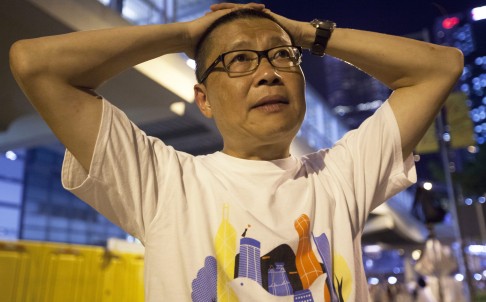
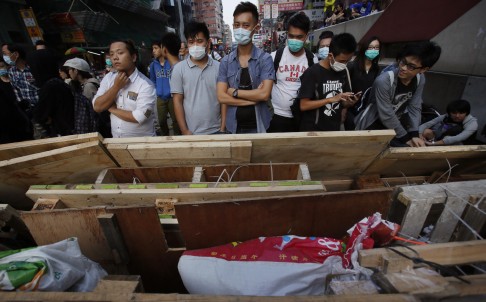
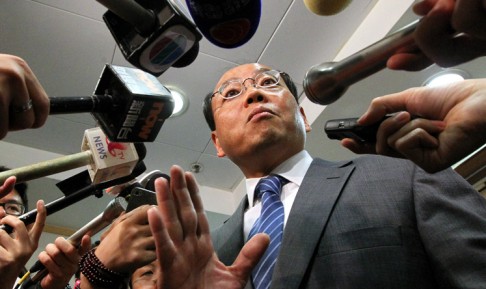
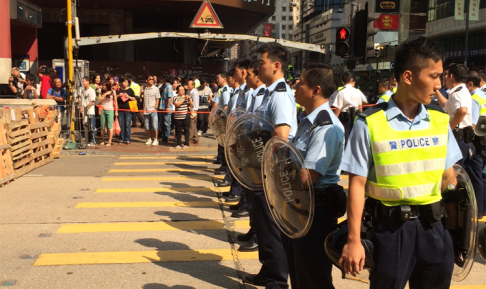
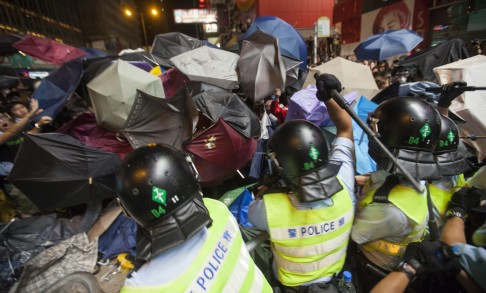
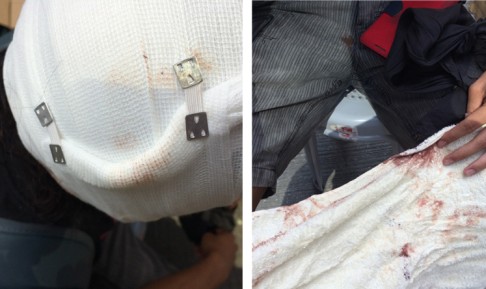
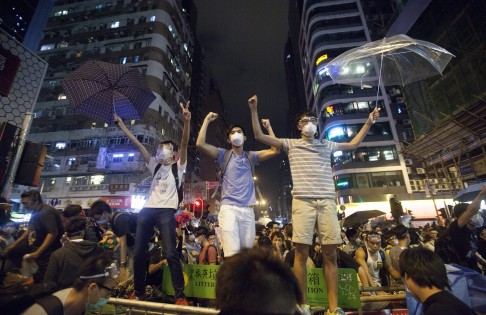
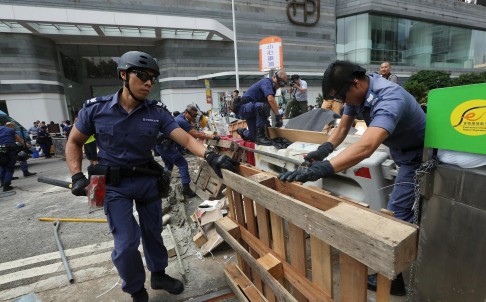
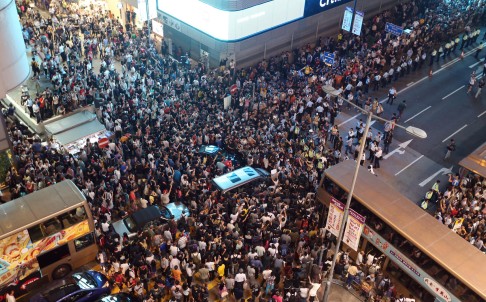


沒有留言:
張貼留言